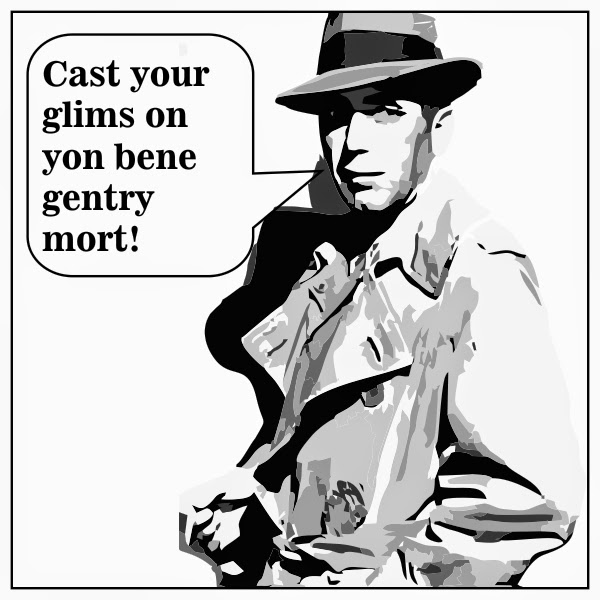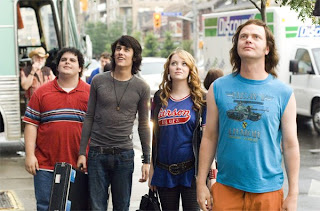Slanging in Tune with the Times
 |
| What's wrong with this picture? |
"Cast your glims on yon bene gentry mort" roughly translates from Thieving Cant to English as "Look at that lovely lady." Neither phrase captures the time and place of "Here's lookin' at you kid."
That's language for you. Always changing. It can be the bane of the historical fiction author and is the delight of a word-lover like myself.
Take the word "gumshoe" as an example. Gum rubber came into use for shoe soles in the 19th Century. The term "gumshoe man" was first applied to thieves, who previously had to take their boots off to be quiet. In 1908, it attached itself to police detectives. In the 1930's, the golden age of detective fiction, all detectives were gumshoes.
Some slang lives on and get's respectable by being added to mainstream dictionaries*. Some even live on in common usage. Others not so much.
A "bash" was a drunken spree in 1900s and can still be one today. "On the make" meant flirting in the 1910s which is close enough to how we use the phrase. And things have been "copacetic" since the 1920s.
Slang for know-it-all, on the other hand, has changed over the years. At the turn of the 20th Century such a person would be called a "Wisenheimer". In the 1930s, he was an "Abercrombie". Now we'd say "Smart Aleck". Our children have been "ankle-biters" and "rug rats" at various times, but they're been "kids" for centuries. Since authors and readers are a bit like time travellers, the trick is to make sure you never use a word or phrase before it's time.
Here are a few examples from the first half of the 20th Century.
1900s
- Goop: A stupid person.
- Hanging: Excellent, outstanding (“Hanging new tie there, old man!”).
- Hep: Part of the current musical culture (“That cat is hep!”).
- Duck soup: Something easy.
- Gas: A joke.
- Grifter: A con artist.
- Hoosegow: Prison.
- Jake: Alright (e.g., “Is everything Jake out here?”).
- 23 skiddoo: to get going; move along; leave; or scram
- Bank’s closed: No kissing or making out (“Sorry babe, bank’s closed.”).
- Cash or check?: Do you kiss now or later?
- Chassis: The female body.
- Drugstore cowboy: A guy that hangs around on a street corner, trying to pick up girls.
- Fish: A college freshman or a first-timer in prison.
- I have to go see a man about a dog: To go buy whiskey. (Not to be confused with seeing a man about a horse, which is older, and means going to pee.)
- Splifficated: Drunk.
- The bee's knees: excellent; outstanding
- Abyssinia: I’ll be seeing you.
- Blow your wig: To become really excited.
- Dog soup: A glass of water.
- Eggs in coffee: To run smoothly, or a general phrase of approval.
- Gig: a job
- Juke joint: a casual and inexpensive establishment with drinking, dancing, and blues music, typically in the southeastern United States
- You shred it, wheat!: You said it.
- Blockbuster: a huge success
- Cook with gas: To do something right.
- Cool: excellent; clever; sophisticated; fashionable; or enjoyable
- Dead hoofer: A bad dancer.
- Ducky shincracker: A good dancer.
- Hi sugar, are you rationed?: Are you going steady?
- Keeping up with the Joneses: competing to have a lifestyle or socioeconomic status comparable to one's neighbors
- Smooch: kiss
- Back seat bingo: Making out in a car.
- Big brother is watching you: someone of authority is monitoring your actions
- Boo-boo: a mistake; a wound
- D.D.T.: “Drop dead twice.” (Appropriate response: “What, and look like you?”)
- Frosted: Angry.
- Hipster: an innovative and trendy person
- Lay a patch: To accelerate so rapidly you leave a patch of rubber on the road. (AKA: I'm outta here!)
*Did you know that The Oxford Dictionary never retires words, only adds them? The Complete Oxford Dictionary fills volumes.That's why I only have the Concise Oxford Dictionary on my desk.


Comments
Post a Comment
We would love to hear from you but hope you are a real person and not a spammer. :)